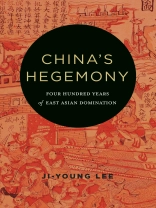Many have viewed the tribute system as China’s tool for projecting its power and influence in East Asia, treating other actors as passive recipients of Chinese domination. China’s Hegemony sheds new light on this system and shows that the international order of Asia’s past was not as Sinocentric as conventional wisdom suggests. Instead, throughout the early modern period, Chinese hegemony was accepted, defied, and challenged by its East Asian neighbors at different times, depending on these leaders’ strategies for legitimacy among their populations. This book demonstrates that Chinese hegemony and hierarchy were not just an outcome of China’s military power or Confucian culture but were constructed while interacting with other, less powerful actors’ domestic political needs, especially in conjunction with internal power struggles.
Focusing on China-Korea-Japan dynamics of East Asian international politics during the Ming and High Qing periods, Ji-Young Lee draws on extensive research of East Asian language sources, including records written by Chinese and Korean tributary envoys. She offers fascinating and rich details of war and peace in Asian international relations, addressing questions such as: why Japan invaded Korea and fought a major war against the Sino-Korean coalition in the late sixteenth century; why Korea attempted to strike at the Ming empire militarily in the late fourteenth century; and how Japan created a miniature tributary order posing as the center of Asia in lieu of the Qing empire in the seventeenth century. By exploring these questions, Lee’s in-depth study speaks directly to general international relations literature and concludes that hegemony in Asia was a domestic, as well as an international phenomenon with profound implications for the contemporary era.
Mục lục
Acknowledgments
Introduction
1. Understanding the Tribute System
2. Chinese Hegemonic Authority: A Domestic Politics Explanation
3. The Making of Ming Hegemony
4. The Imjin War (1592–1598)
5. The Making of Qing Hegemony
Conclusion
Notes
Bibliography
Index
Giới thiệu về tác giả
Ji-Young Lee is an assistant professor of international relations at the School of International Service, American University, where she holds the C. W. Lim and Korea Foundation Professorship of Korean Studies.












